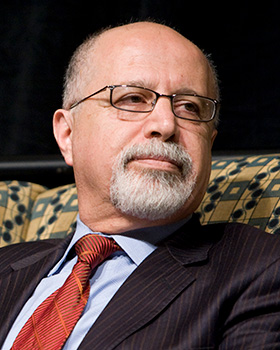Speakers

Phyllis Bennis
Director of the New Internationalist Project
Institute for Policy Studies
Moderator
Event Summary
On January 28, 2020, Arab Center Washington DC (ACW) hosted a panel discussion titled “Trump, Netanyahu, and Middle East Peace Processing.” Khalil E. Jahshan, ACW executive director, moderated and spoke at the event along with Phyllis Bennis, director of the New Internationalist Project at the Institute for Policy Studies, and Shibley Telhami, Anwar Sadat Professor for Peace and Development at the University of Maryland, College Park.
Phyllis Bennis described the meeting between President Donald Trump and Israeli Prime Minister Benjamin Netanyahu to announce their long-awaited “peace plan” as one between the “impeached and the indicted.” She characterized the process as highly politicized, having little to do with peace or with justice, and asserted it will have little impact on the ground and will make meaningful diplomacy more difficult. Bennis said that, at base, it is designed to provide legal and political protection “to keep Trump in the White House and keep Bibi Netanyahu out of jail.” She explained how Trump’s pro-Israel tendencies have solidified over the last three years as evidenced by his recognition of Jerusalem as Israel’s capital, Israel’s sovereignty over the Syrian Golan Heights, and the legality of Israeli settlements in the occupied West Bank—all contrary to international law. That, she said, was in addition to defunding UNRWA, closing the PLO office in Washington, accepting Israel’s Nation State Law, criminalizing the Boycott, Divestment, and Sanctions movement, and tying any criticism of Israel to anti-Semitism.
Bennis maintained that the Trump plan is “grounded in the denial of rights” to the Palestinians, including the right of return, and in the acceptance of full Israeli control over all occupied territories and Jerusalem. She also saw the plan as ending the Palestinians’ right to resist. She noted that although US support for Israel has remained consistent over the years, public discourse in the United States has shifted enormously, with small shifts in the US media as well, and that an emphasis on a rights-based approach is redefining the issue. She said that support by Palestinian civil society, like that for BDS, has shaped a new understanding of Palestinian rights internationally.
Shibley Telhami cautioned against calling the Trump Administration’s announcement a “deal” because the Palestinians had no part in its negotiation. Further, he said it is not a peace plan because it clearly is not intended to bring peace to the region. Rather, Telhami explained, the agenda behind the plan is to legitimize Israel’s settlements, rule over Jerusalem, and control over the West Bank. He explored the driving principles behind the plan and pointed to the central expectation by the United States and Israel that Palestinians should “accept reality as it is” and “accept less” because they are the weaker party. Israel’s military advantage and supremacy in the region has been guaranteed principally by US military aid over many decades and by the US employment of veto power at the United Nations. Indeed, Telhami continued, Washington’s longstanding support for Israel’s unjust policies makes the United States complicit in the inequality that now exists for Palestinians. He said that presidential advisor Jared Kushner’s dismissal of history is belied by his dangerous and selective use of the religious narrative of history, which aims to justify Israel’s taking control of the West Bank and Jerusalem.
As for the reaction to the plan, Telhami stated that the Palestinians will clearly not accept it but may get little political backing from the Arab states because Palestinian leaders have allowed support in the Arab world to erode over the years. For their part, Arab governments are distracted from this issue, Telhami noted; they have more immediate interests with the Trump Administration and most will be accommodationist. For Arab public opinion, Palestine continues to be an extremely important identity issue, he explained, although it is now not a priority. The Palestinian citizens in Israel have gained ground, especially in representation in the Knesset, he asserted, and are playing a bigger role in Israeli politics. Telhami said that polls in the United States show that public opinion about Israel has changed, especially among Democrats. However, in the short term, the Democrats’ most immediate concern is to defeat Trump in November.
Khalil E. Jahshan enumerated the basic features of Trump’s proposed peace plan and characterized it as “a veiled attempt by Trump to save Netanyahu from political extinction” and a way to enhance the reelection chances for both leaders. He said that attempts at peacemaking in the Middle East are not new; he calculated that this plan represents the 77th attempt at resolving the Israeli-Palestinian conflict since 1937, pointing to a huge “cemetery of peace proposals” in the region. Jahshan said that he would have expected the parties to examine why these earlier attempts have failed in order to avoid past mistakes; however, he described Trump and Netanyahu as fulfilling the proverb, “the blind leading the blind.” As for the Palestinian leadership, he stated that it has remained passive and failed to come up with a new and effective strategy to deal with the latest Trump plan. In light of extensive leaks about the plan in recent weeks, Jahshan asked, what if the Palestinian leadership in Ramallah had studied its basic faulty principles and issued, simultaneously, a manifesto with its own clear vision for peace?
Event Photos


